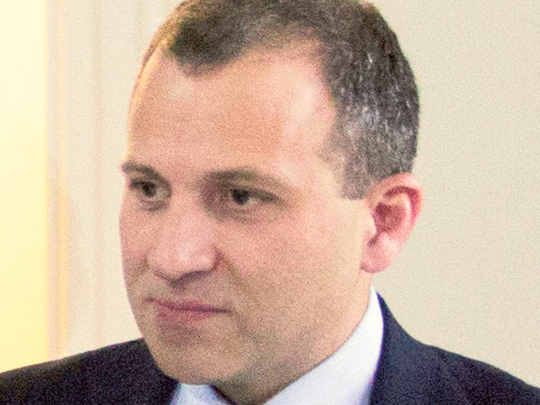
Beirut: For the third time in as many months, Lebanese Foreign Minister Jibran Bassil abstained from a crucial League of Arab States (LAS) vote that designated Hezbollah a terrorist organisation. Only Iraq stood with Lebanon on Friday while Algeria expressed reservations about the vote.
Bassil argued that the LAS criteria to designate an entity as a terrorist group was not in line with the United Nations’ classification, or with that of Arab treaties, since it was a resistance movement. “Hezbollah represents an essential component” of Lebanese society with parliamentary and ministerial representations, he insisted.
League delegates were probably as surprised by a particularly one-sided denunciation delivered by the Iraqi Foreign Minister, Ebrahim Al Jaafari, who praised Hezbollah and its intervention against extremists in his country.
“Whoever accuses the Popular Mobilisation [a Shiite militia fighting alongside the Iraqi army] forces and Hezbollah of terrorism is the one who supports and adopts terrorism,” Al Jaafari declared, which led to a walkout by the Saudi delegation. The Iraqi official further rejected what he claimed were attempts to distort the image of Hezbollah secretary-general, Hassan Nasrallah, whom he identified as an “Arab hero who defended values and principles.”
However, in a partial climbdown, Bassil agreed to the gist of the LAS resolution that condemned Hezbollah for its freely acknowledged military involvements in ongoing conflicts in Syria, Yemen, Bahrain and Iraq, and went so far as to reiterate previous explanations that Beirut agreed with the censures that followed Iranian attacks on Saudi diplomatic missions in Tehran and Mashhad. He, nevertheless, emphasised that declaring Hezbollah a terrorist group was a different matter and apparently tried to persuade Arab Gulf delegations not to include the specific words — “terrorist organisation” — in the final text.
That was not to be as Saudi Arabia and its Arab Gulf partners accused the militia of supporting the Iranian-backed Baath regime in Syria, rebels in Yemen, anti-monarchy elements in Bahrain, assorted groups that targeted Sunnis in Iraq and, perhaps far worse, of training indigenous Arab Gulf nationals in Kuwait and elsewhere to bear arms against their governments. Equally egregious were the venomous attacks by Nasrallah, who seldom failed to identify Riyadh in a “Wahhabi-takfiri-terrorist” triptych in his bombastic and very frequent television shows, while throngs of Hezbollah supporters chanted “Death to the Al Saud” in large open air arenas that flew the party’s flags alongside those of Iran.
Lebanese politicians were sharply divided over Bassil’s positions, with the March 14 alliance members criticising him of isolating the country from its natural Arab environment, even if the latest Cairo vote (and accompanying explanations) were apparently cleared with Prime Minister Tammam Salam.
A week ago, Interior Minister Nouhad Machnouk, who represents March 14’s Future Movement in the cabinet, refused to endorse a statement classifying Hezbollah as a terrorist group at a meeting of interior ministers in Tunis, which illustrated Beirut’s intrinsic dilemmas: how to maintain internal stability —a nd prevent renewed civil war — without reneging on traditional Arab commitments.
In a strongly worded statement, Hezbollah maintained that the GCC and LAS decisions “will not prevent [them] from condemning the crimes of Saudi Arabia in Yemen, the kingdom’s financing and support of terrorist groups in Iraq and Syria, or its collaboration with (Israel),” which was akin to the pot calling the kettle black since it is such behaviours that the party has been known to practice.
On Thursday, the US Ambassador-designate to Lebanon, Elizabeth Richard, told the Senate Foreign Relations Committee that conducted hearings on her nomination in Washington, D.C., that Hezbollah is “a terrorist organisation that puts its own interests and those of its foreign backers ahead of the Lebanese people”. She slammed the party for fighting alongside Syrian President Bashar Al Assad against the will of the Lebanese people. “My mission,” she emphasised, “will be to do everything I can to support Lebanon to exercise full sovereignty throughout the country and to help build up the Lebanese military, its sole legitimate defender,” which raises the prospect of a clash with Bassil if and when she makes it to Beirut.












